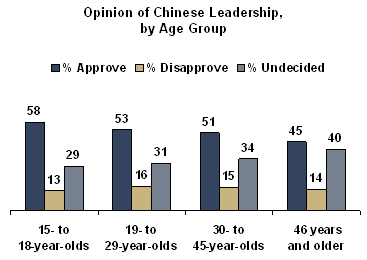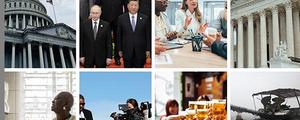GALLUP NEWS SERVICE
Gallup's findings across 19 African countries suggest that, overall, Africans are somewhat more likely to say they approve of leaders in the United States than those in China. But the high proportion of "undecideds" throughout Africa suggests that even among Africans who do offer opinions, perceptions may be tentative and subject to change.
As the pageantry surrounding last weekend's China-Africa summit demonstrated, Chinese leaders would like to give more Africans reason to see them in a positive light. In recent years, the Chinese government has made substantial loans to many African countries. Unlike the United States (and other Western nations), China publicly characterizes its loans as having "no strings attached."
On the diplomatic front, China has supported a variety of changes to the U.N. Security Council's peacekeeping and debt relief policies; in return, it likely hopes to influence the 53 U.N. votes that African countries hold. Recently, Chinese Premier Wen Jiabao visited seven African nations, a diplomatic tour that resulted in 71 agreements covering politics, economy, trade, infrastructure, culture, education, and science and technology. These agreements form the basis for a relationship with Africa that China actively promotes in African media.
Why do China's efforts to curry favor in Africa concern the world? Not only is China quickly gaining preferential access to sub-Saharan Africa's vast natural resources, but trade between China and Africa is growing rapidly, having ballooned from $10 billion at the beginning of the decade to an estimated $50 billion this year. China's recent loans to Angola and Nigeria in exchange for oil, and its success in securing tender to build a portion of a major highway in Nigeria, are recent examples of this.
Gender Gaps
Who are the "undecided" Africans that public relations efforts are most likely to sway -- that is, those who have yet to form any opinions of the U.S. or Chinese leadership? One notable finding is that they are more likely to be women than men. Looking across all 19 African countries studied, Gallup finds that more men than women approve of the leadership in the United States, 62.2% vs. 55.4%. The same is true regarding opinions of Chinese leadership, but the gap is slightly wider: 56.3% of men approve, vs. 46.2% of women.
These differences are accounted for by the greater likelihood of women to fall into the undecided category. Across all 19 countries, 18.7% of men are undecided regarding U.S. leadership, compared with 30.5% of women. Countries in which the undecided rate for this question is high among women (approaching 20% or more) include Angola, Benin, Botswana, Cameroon, Ethiopia, Ghana, Kenya, Nigeria, South Africa, Tanzania, and Uganda. There is a similar pattern with regard to the question on Chinese leadership. Overall, 27.4% of men across the countries studied did not give an opinion on China's leaders, vs. 40.7% of women.
Comparing ratings of the two countries' leadership among women who do offer opinions, the edge goes to the United States over China. Table 1 compares the gaps between approval of U.S. leaders and approval of Chinese leaders among men and women across the 19 African countries studied. The approval gap favors U.S. leadership more strongly among women than among men (9.2 percentage points versus 5.9 points, respectively). Both men and women are more likely to be undecided about China's leadership than they are about U.S. leaders.
|
Table 1: Size of the Gap Between U.S. and Chinese Leadership Ratings, by Gender Across 19 African Countries
|
||
|
|
Approve |
Undecided |
|
Men |
5.9 points higher
|
8.7 points lower
|
|
Women |
9.2 points higher
|
10.2 points lower
|
Generation Gaps
Important differences are also apparent by age group:
- The older the respondent, the less likely he or she is to approve of leadership in the United States or China.
- The disapproval rate is relatively constant among age groups.
- The older the respondent, the more likely he or she is to offer no opinion.
Both the gender gap and the age gap may be associated with comparatively lower literacy rates across sub-Saharan Africa among females and among older people.
As Table 1 does for men vs. women, Table 2 compares the gaps between U.S. leadership approval and Chinese leadership approval by age category. Gaps among the undecided are also compared.
|
Table 2: Size of the Gap Between U.S. and Chinese Leadership Ratings, by Age Group
|
||
|
Age |
Approve |
Undecided |
|
15 to 18 |
7.4 points higher
|
9.4 points lower
|
|
19 to 29 |
9.4 points higher
|
11.2 points lower
|
|
30 to 45 |
5.2 points higher
|
7.9 points lower
|
|
46+ |
8.3 points higher
|
8.7 points lower
|
The pattern by age group is similar to what is seen with regard to gender. Respondents of all surveyed ages are more likely to favor U.S. leadership than Chinese leadership, although the gap is wider among some groups than others. And more Africans in each age category are undecided about China's leadership performance than are undecided about America's.

Currently, Africans are somewhat more likely to feel positive about the performance of leaders in the United States than about the performance of Chinese leaders. However, their perceptions may not be particularly well-formed at this point -- and the latter country has thus far shown greater determination to actively influence those perceptions through increased trade, more consistent support for developing countries, and its "no strings attached" position on aid.
Gallup will monitor Africans' perceptions closely in the coming years as the continent begins to play a bigger role on the world stage. The early impressions of millions of Africans will be important to how that development progresses, and who benefits most from it in the end.
Survey Methods
Results are based on face-to-face interviews with randomly selected national samples of approximately 1,000 adults, aged 15 and older, who live permanently in the 19 African nations surveyed. For results based on these samples, one can say with 95% confidence that the maximum error attributable to sampling and other random effects is ±3 percentage points. In addition to sampling error, question wording and practical difficulties in conducting surveys can introduce error or bias into the findings of public opinion polls.
